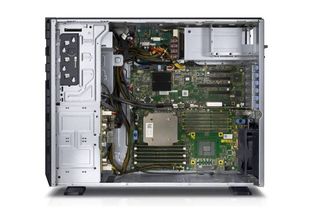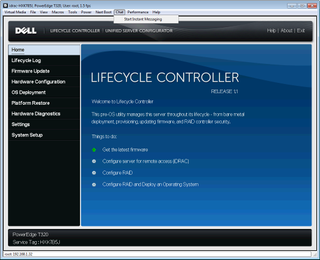IT Pro Verdict
SMBs looking for a new Xeon E5 server without the added expense of dual sockets will find the T320 well worth considering. It delivers E5-2400 power at a reasonable price, has plenty of room to expand and its low noise levels and solid built quality make it suitable for use in small offices.
Pros
- +
Good value; Xeon E5 power; High storage potential; Quiet; Low power consumption
Cons
- -
High specification parts make it expensive
Despite the obvious cost benefits of single socket Xeon E5 servers for small businesses, there is a small number of choices available from the blue chips. IBM, Lenovo and HP don't offer any leaving Dell's PowerEdge T320 in the enviable position of having little competition.
The T320 is designed to offer SMBs a good value workhorse capable of running a wide range of applications. It targets apps such as file and print sharing, email and messaging but it's also aimed at deployments in small remote or branch offices for providing local IT services.
Prices start at 499 which gets you a basic 2.6GHz Pentium 1403 CPU in the driving seat. Dell also offers a 2.8GHz E5-1410 Xeon which costs around 200 more or you have a choice selection of E5-2400 CPUs.
Our review system has a 1.8GHz E5-2403 Xeon which is a member of the Basic E5-2400 family and the slowest of them all. It offers four cores, a 10MB L3 cache and a 6.4GT/sec QPI but memory speeds are limited to 1,066MHz and it doesn't support HyperThreading or Turbo Boost.

The PowerEdge T320 uses the same motherboard as the T420 but with the second CPU socket and attendant DIMM slots removed
Power and noise
The E5-2403 has a low TDP of 80W which showed up nicely in our power tests. With Windows Server 2012 idling along, we clocked the review system pulling a modest 68W which only rose to 81W when under heavy load from the SiSoft Sandra CPU benchmarking app.
Our system included the basic 350W cabled PSU but you can go for power redundancy. Dell offers dual 475W and 750W hot-plug PSUs but you must choose them during the order process.
The server is very quiet as well and is recommended for small offices that demand tranquillity. All chassis cooling is handled by a single 12cms diameter fan at the rear which barely makes a sound.

Dell's embedded Lifecycle Controller makes light work of OS deployment and firmware upgrades
Dave is an IT consultant and freelance journalist specialising in hands-on reviews of computer networking products covering all market sectors from small businesses to enterprises. Founder of Binary Testing Ltd – the UK’s premier independent network testing laboratory - Dave has over 45 years of experience in the IT industry.
Dave has produced many thousands of in-depth business networking product reviews from his lab which have been reproduced globally. Writing for ITPro and its sister title, PC Pro, he covers all areas of business IT infrastructure, including servers, storage, network security, data protection, cloud, infrastructure and services.



